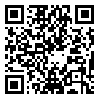Volume 14, Issue 11 (2-2015)
Iranian Journal of Medical Education 2015, 14(11): 998-1006 |
Back to browse issues page
Download citation:
BibTeX | RIS | EndNote | Medlars | ProCite | Reference Manager | RefWorks
Send citation to:



BibTeX | RIS | EndNote | Medlars | ProCite | Reference Manager | RefWorks
Send citation to:
Lavizeh M, Kouhpayeh zadeh J. Validity and Reliability of the Attitudes towards and Self-Reported Ability in Evidence-Based Medicine Questionnaire. Iranian Journal of Medical Education 2015; 14 (11) :998-1006
URL: http://ijme.mui.ac.ir/article-1-3378-en.html
URL: http://ijme.mui.ac.ir/article-1-3378-en.html
() MSc in Medical Education, Tehran West Health center, Faculty of Medicine, Iran University of Medical sciences, Tehran, Iran. E-mail:mahshidlavizeh@yahoo.com , mahshidlavizeh@yahoo.com
Abstract: (6154 Views)
Introduction: Evidence-Based Medicine is the proper application of the best available evidence in making health care decisions for each patient and merging personal clinical experiences with the best available clinical evidence resulted from systematic research. This study aimed to investigate the validity and reliability of the attitudes towards and self-reported ability in evidence based medicine questionnaire among general practitioners (GPs) in health care centers of Iran University of Medical Sciences.
Methods: This descriptive study was performed on all general practitioners in health care centers of Iran University of Medical Sciences (n=80) who were selected through convenient sampling in 2014. Baum’s questionnaire of attitudes towards and self-reported ability in evidence based medicine was translated into Persian and after verification of the translation the questionnaire was distributed among general practitioners. The collected data were analyzed using Pearson’s correlation coefficients, Cronbach's alpha and factor analysis.
Results: The reliability in terms of internal consistency was higher than 0.7 for all questions. Content Validity Index (CVI) and Content Validity ratio (CVR) were 0.789 and 0.7 respectively. For the construct validity, 71.79 percent of the variance was explained by two factors of attitudes and practices. Cronbach's alpha coefficient was 0.396 for attitudes and 0.934 for self-reported ability it was 0.784 for the whole instrument. Most of the GPs considered everyday use of EBM useful. Confirmatory factor analysis showed that the highest score was related to design of questions for a given clinical situation and the lowest score was related to search and find an article in less than 5 minutes.
Conclusion: The Persian version of attitudes towards and self-reported ability questionnaire is reliable and valid.
Type of Study: Original research article |
Subject:
Community Based Medicine
Received: 2014/08/14 | Accepted: 2014/12/20 | Published: 2015/02/2 | ePublished: 2015/02/2
Received: 2014/08/14 | Accepted: 2014/12/20 | Published: 2015/02/2 | ePublished: 2015/02/2
پرسشنامه مطالعه [DOC 83 KB] (299 Download)
Send email to the article author
| Rights and permissions | |
 |
This work is licensed under a Creative Commons Attribution-NonCommercial 4.0 International License. |




